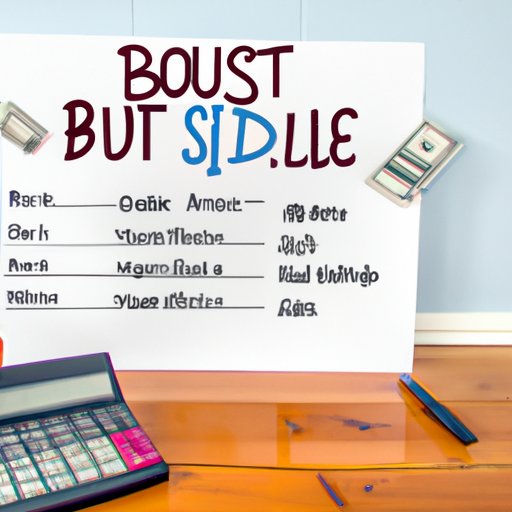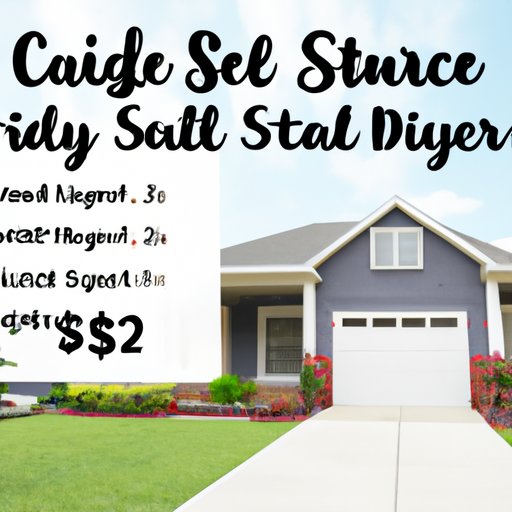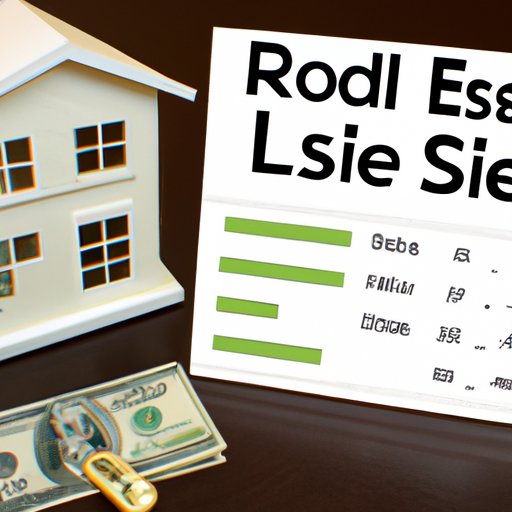Introduction
Selling your home is an exciting experience, but it can also be expensive. Before you list your home for sale, it’s important to understand the costs associated with the process. The cost of selling a home depends on a variety of factors, including the value of the home, the market conditions, and the local real estate market. In this article, we’ll discuss the cost of selling a home and provide tips on how to budget for the expenses.
Calculating the Cost of Selling a Home: A Breakdown of Expenses
When calculating the cost of selling a home, there are several key expenses to consider. Let’s take a look at each one in detail.
Real Estate Agent Commissions
The most significant expense when selling a home is typically the commission paid to the real estate agent or broker. Commission rates vary depending on the market, but they usually range from 5-6% of the home’s sale price. For example, if you sell your home for $200,000, you would pay a commission of $10,000-$12,000.
Closing Costs
Closing costs are the expenses associated with the transfer of ownership of the home. These costs include title insurance, escrow fees, notary fees, and homeowner’s insurance. Closing costs typically range from 2-5% of the home’s sale price. For example, if you sell your home for $200,000, you would pay closing costs of $4,000-$10,000.
Advertising and Promotion Expenses
When selling a home, you may need to invest in advertising and promotion expenses. These expenses can include open houses, print ads, and online marketing campaigns. Advertising and promotion expenses typically range from 1-3% of the home’s sale price.
Home Preparation and Repair Costs
Before listing your home for sale, you may need to make repairs or improvements to increase its value. These expenses can include painting, landscaping, and cleaning. Home preparation and repair costs typically range from 1-3% of the home’s sale price.
Moving Expenses
If you’re moving to a new home after selling your current one, you’ll need to factor in the cost of moving. Moving expenses can include hiring movers, renting a truck, and packing materials. Moving expenses typically range from 0.5-2% of the home’s sale price.

How to Budget for the Costs of Selling a Home
Now that you have a better understanding of the costs associated with selling a home, let’s discuss how to budget for them. Here are a few tips to keep in mind:
Estimate Your Expenses
The first step in creating a budget for the cost of selling a home is to estimate your expenses. Take into account all of the expenses discussed above, as well as any other fees or costs that may apply. Once you have an estimate, you can create a realistic budget for the process.
Set a Realistic Budget
Once you have an estimate of your expenses, set a realistic budget for the process. Make sure that you factor in all of the costs associated with selling your home, as well as any unexpected costs that may arise. This will help ensure that you don’t go over budget during the process.
Use an Online Calculator
There are several online tools available to help you estimate the cost of selling a home. These calculators can help you get an estimate of your expenses and create a realistic budget for the process.
What Fees Will You Pay When Selling Your Home?
In addition to the expenses discussed above, there are several fees that you may need to pay when selling your home. These include:
Transfer Tax
Transfer tax is a fee charged by the government when a property is transferred from one owner to another. Transfer taxes are typically based on the value of the property and vary by state.
Property Taxes
Property taxes are taxes levied by the local government on the value of the property. Property taxes are typically based on the assessed value of the property and vary by state.
Homeowners Association (HOA) Fees
If your home is part of a homeowners association (HOA), you may need to pay HOA fees when you sell your home. HOA fees are typically based on the size of the property and vary by association.
Loan Payoff Fees
If you have a mortgage, you may need to pay loan payoff fees when you sell your home. Loan payoff fees are typically based on the amount of the loan and vary by lender.

How to Reduce the Cost of Selling Your Home
There are several ways to reduce the cost of selling your home. Here are a few tips to keep in mind:
Negotiate the Commission
When selecting a real estate agent or broker, negotiate the commission rate. Many agents are willing to work with you to lower the commission rate, which can save you money in the long run.
Don’t Make Unnecessary Repairs
When preparing your home for sale, don’t make unnecessary repairs. Focus on making only necessary repairs and improvements to increase the value of your home without breaking the bank.
Don’t Overprice Your Home
When pricing your home, don’t overprice it. Overpricing your home can lead to a longer selling process and more expenses. Work with your real estate agent to come up with a realistic price for your home.
Offer Incentives to Buyers
Offering incentives to buyers can help attract potential buyers and reduce the time it takes to sell your home. Common incentives include offering to cover closing costs or offering a home warranty.
A Guide to Understanding Closing Costs When Selling Your Home
Closing costs are the expenses associated with the transfer of ownership of the home. Here is a breakdown of the most common closing costs:
Title Insurance
Title insurance is a fee charged to protect the buyer from any title defects or liens on the property. Title insurance is usually based on the value of the property and varies by insurer.
Escrow Fees
Escrow fees are fees charged to manage the closing process. Escrow fees are typically based on the value of the property and vary by provider.
Notary Fees
Notary fees are fees charged by a notary public to notarize documents related to the sale. Notary fees are typically based on the number of documents and vary by state.
Homeowner’s Insurance
Homeowner’s insurance is a fee charged to insure the home against damage or loss. Homeowner’s insurance is typically based on the value of the property and varies by insurer.

The Hidden Costs of Selling a Home: What to Watch Out For
In addition to the expenses discussed above, there are several hidden costs associated with selling a home. These include:
Hiring Professional Cleaners
You may need to hire professional cleaners to prepare your home for sale. Professional cleaners typically charge an hourly or flat rate for their services.
Staging Your Home
If you want to give your home a “showroom” look, you may need to hire a professional stager. Stagers typically charge an hourly or flat rate for their services.
Potential Legal Fees
If you encounter any legal issues during the process, you may need to hire an attorney. Attorneys typically charge an hourly or flat rate for their services.
Storage Fees
If you need to store your belongings while you’re in the process of selling your home, you may need to rent a storage unit. Storage units typically charge a monthly or yearly fee.
Conclusion
Selling a home can be a costly process, but with the right preparation and budgeting, you can minimize the expenses. By understanding the costs associated with selling a home and taking steps to reduce them, you can ensure that you stay within your budget and maximize your profit.
(Note: Is this article not meeting your expectations? Do you have knowledge or insights to share? Unlock new opportunities and expand your reach by joining our authors team. Click Registration to join us and share your expertise with our readers.)
